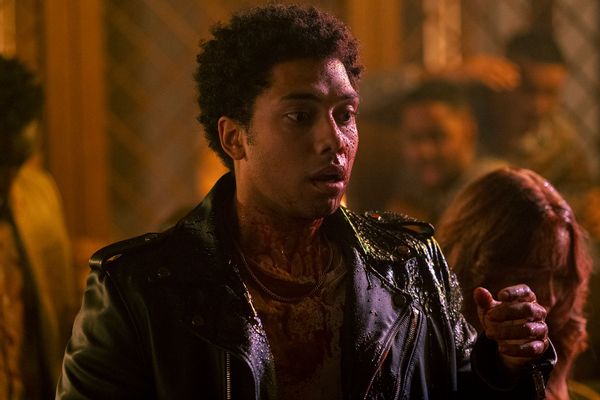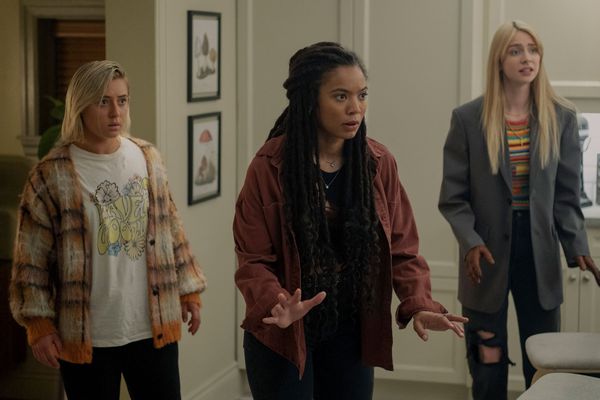“Gen V” is bloody and raunchy enough to live up to the expectations set by “The Boys”
Once you understand that every superhero tale is some variation of a handful of scenarios, a franchise’s signatures are easy to spot. “Gen V” announces its lineage less than two and a half minutes in the first episode, when we have our first bloodletting – a few drops, then more before, in a blink, a room’s walls are bathed in chunky red. About halfway through the debut, we’re smacked in the face with a huge penis rendered with alarming accuracy, which is both perverse and entirely on brand for a spinoff of “The Boys.”
Viewers familiar with the series that originated this college by-product will probably find the presence of an exposed male member and gore reassuring. But there never was a reason to think co-showrunners Michelle Fazekas and Tara Butters would pull their punches. The pair brought us “Agent Carter” and the underappreciated “Reaper” for the CW — they get this realm and our expectations.
Given comparative naivete under which these young men and women are coming of age, though, erring a little more on the side of sentiment as opposed to fully reproducing its parent series’ ruthlessness would be understandable.
That would also contradict everything we understand about this alternate reality, where the Vought corporation controls every aspect of humankind, from the government to the TV and industries, our snacks and our agency.
Every student at Godolkin University is a kid whose parents wanted only the best for their children, which sounds like a good defense for shooting up youngsters with Compound V, a manufactured serum that could give a child special abilities, or harm them, or do absolutely nothing.
Distilling “Gen V” to this makes it an allegory for consent . . . in theory. In practice, the show that gathers a campus’ worth of walking metaphors under the giant tent of corporate manipulation, collegiate edition.
“Gen V” could be allegory for consent … in theory.
In the spirit of “The Boys,” “Gen V” satirizes our willingness to amenability to be commodified in service of fame and validation. That’s not what originally motivates our main hero Marie Moreau (Jaz Sinclair) to dream of joining The Seven. Like Middle America’s royalty Starlight, she wants to fight for justice while breaking barriers. Were she to be accepted into America’s elite hero squad, that would make her the first Black woman to earn that honor.
Sadly she has strikes against her having nothing to do with race, her socioeconomic status or the fact that she’s an orphan. With the right spin her story of succeeding without parents to guide her would be a terrific narrative, especially for the PR-obsessed Vought. It’s her powers that present a problem — Marie manipulates her blood into lethal projectiles, whips or snares, as a few examples.
Gross, right?
Never mind contemplating how unmarketable that is in the Rust Belt – no cereal company would put her image on a box. (Tampon manufacturers might, given her origin: her powers manifest when she menstruates for the first time.) Any way you cut it, she’s destined to be an outsider at God U, to which she gains acceptance based on academic merit alone . . . and gets her nowhere from the moment she clears orientation.
Everyone wants to be assigned to the crime-fighting school, but most undergrads are siphoned into its drama department, a farm for low-level celebrities. That’s where Marie is initially herded.
Grades and academic performance matter less than who you know and what you can do for the university’s reputation, where success is determined through an almighty ranking system that makes cracking the Top 10 everyone’s greatest goal.
 Chance Perdomo in “Gen V” (Brooke Palmer/Prime Video)
Chance Perdomo in “Gen V” (Brooke Palmer/Prime Video)
Luke, aka Golden Boy (Patrick Schwarzenegger), rules that echelon along with his fellow seniors and best friend Andre Anderson (Chance Perdomo) and girlfriend Cate Dunlap (Maddie Phillips), your standard issue mean girl who has the power to “push” people, i.e. compel them to do anything she wants.
Running in their circle is Jordan Li, a bi-gender shapeshifter (Derek Luh in their male form, London Thor when they are female) who’s also the gatekeeper for a key faculty member, Professor Rich “Brink” Brinkerhoff (Clancy Brown).
Each is internet famous, with Golden Boy’s powers of spontaneous combustion and superstrength placing him on track to join The Seven right after he graduates. Our first glimpse of what he can do ends with him ripping off a classmate’s arms, ending their friendly sparring match.
Marie, in contrast, doesn’t have a mobile phone or a social media account and accesses her ability by slicing open her hand, all of which immediately endears her to her roommate Emma Meyer (Lizze Broadway). Emma also feels like a reject, despite being a minor internet star known as Little Cricket. Under the alter ego, she shrinks to action figure size and makes funny videos.
They’re both nobodies until a campus tragedy captured via multiple angles on students’ cell phone cameras makes Marie somebody, putting her on the radar of the school’s dean Indira Shetty (Shelley Conn), and placing a target on her back.
Individually these characters represent struggles common to adolescents and college life, whether through their powers or how others weaponize their abilities against them. (Marie’s a cutter, hello.) But the college itself is one giant stand-in for every exploitative practice in the realm of university politics, from taking advantage of athletes to the assortment of reputational handwashing that comes at the expense of marginalized groups and crime victims.
There should always room for a new class.
That the show never gets serious about any of this dilutes some of its potential as a parable, which isn’t necessarily to its detriment. For all the effort “The Boys” makes to call out to America’s willingness to embrace fascism provided that it is packaged handsomely, series creator Eric Kripke knew that the bloody enmity between Karl Urban’s Butcher and Antony Starr’s Homelander was the main reason people watched.
There was and is always something more nefarious afoot than Butcher’s beef with supes, and in the course of excavating up that evil we witness how racist, sexist and homophobic Vought and its surrogates and beneficiaries are.
Season 1 of “Gen V” unrolls similarly, with that previously cited incident upending the social hierarchy and thrusting Marie to the top of the campus heap. Nothing about this is accidental, as Marie, Emma and the school’s other top dogs stumble on a grim conspiracy – which we trust them to defeat, if not necessarily remaining in one piece while doing so.
 Lizz Broadway, Jaa Sinclair and Maddie Phillips in “Gen V” (Brooke Palmer/Prime Video)
Lizz Broadway, Jaa Sinclair and Maddie Phillips in “Gen V” (Brooke Palmer/Prime Video)
As with all such adventures, the company matters most, and luckily spending time with this cast of relative unknowns is a pleasant cinch. Sinclair ably anchors the ensemble, but Broadway seasons this stew of drama and human offal with her comedic presence and her profound tenderness when a development calls for accessing a fully operational conscience and a kind heart.
Perdomo carries Andre’s angst well enough although, like Phillips, his character is a type we’ve seen in any number shows; he’s most interesting when the actor works with the tension created as Andre defies an overbearing father who has both a heroic legacy and pull within the university’s politics.
The lithely paced six episodes provided for review click well enough with the overall “Boys” world to augment whatever action is coming in next in its upcoming season, with one well-placed cameo reinforcing that connection and the appearance of another familiar figure’s body part – guess which? – reminding us of its insouciance toward boring old decency.
Want a daily wrap-up of all the news and commentary Salon has to offer? Subscribe to our morning newsletter, Crash Course.
Still, if you consider that Darick Robertson and Garth Ennis intended the original comic as an indictment of mainstream superheroes and what they represent, “Gen V” does not refute whatever arguments there are positing these shows have gone astray from that premise.
Truth is, most people are less concerned with this show’s adherence to philosophy or the sharpness of its analogies than they are with seeing how creative the writers can steer their heroes into pulling out someone’s intestines. That’s a gruesome lure, and thin at that, but it should suffice for now.
Without having seen the seventh episode and its eighth, the season finale, it’s hard to predict whether that enthusiasm for “Gen V” can hold — not for lack of an ability, but out of recognition that a mission’s long-term success depends on solidly sticking the first landing. That’s a slippery task for any show let alone the scion of an action romp that set the bar for swinging phalluses and spilled guts. There should always be room for a new class. But if the old school can keep it up – our interest, I mean – one wonders whether this infusion of new blood will feel as essential.
The first three episodes of “Gen V” premiere Friday, Sept. 29 on Prime Video.
Read more
about “The Boys”

